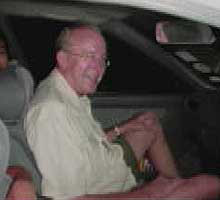 |
 |
 |
 News from Around the Americas | January 2006 News from Around the Americas | January 2006  
US Appeals Court Upholds Provision of Sexual Tourism Law
 BCN BCN


| | A lawyer for Thomas White, said the financier is currently on trial in Puerto Vallarta on one charge of raping a boy. |
San Francisco, CA - A federal appeals court in San Francisco this week upheld a U.S. law that makes it a crime to travel to a foreign country and engage in sex with children for money.

A panel of the 9th U.S. Circuit Court of Appeals said by a 2-1 vote that the law is within Congress's power to regulate foreign commerce under the Commerce Clause of the U.S. Constitution.

The ruling was made in the case of a Washington state man, Michael Lewis Clark, 71, who was convicted of violating the law by paying young boys for sex in Cambodia in 2003.

The court upheld Clark's conviction and rejected his argument that the law exceeded Congress's powers.

Circuit Judge Margaret McKeown wrote, "In light of Congress's sweeping powers over foreign commerce, we conclude that Congress acted within its constitutional bounds in criminalizing commercial sex acts committed by U.S. citizens who travel abroad in foreign commerce."

The Commerce Clause gives Congress the power to "regulate commerce with foreign nations, and among the several states, and with the Indian tribes."

The law under which Clark was convicted is part of a set of recent federal measures originally referred as the sexual tourism law but known since 2003 as the PROTECT Act, short for Prosecutorial Remedies and Other Tools to End the Exploitation of Children Today Act.

A San Francisco financier, Thomas White, 70, currently faces charges in federal court in San Francisco under another provision of the act.

White is accused of conspiring to travel to Mexico between 1999 and 2001 and to Thailand between 2000 and 2003 with the intent to engage in unlawful sexual acts with juveniles.

The law under which White is charged differs from the one upheld today in that it requires proof of traveling with intent to engage in illegal sexual acts, but does not require proof of a commercial transaction.

That law was upheld in another case in 2003 by a federal appeals court in New Orleans, which found that the measure was within Congress's commerce powers.

White was also separately charged in Mexico with sexually abusing eight boys near his villa in Puerto Vallarta.

Stuart Hanlon, a lawyer for White, said the financier is currently on trial in Puerto Vallarta on one charge of raping a boy. Hanlon said that other Mexican charges of corrupting youths have been dropped.

Hanlon said he did not know whether or when White will be extradited to the United States or when his U.S. trial would be held. Federal prosecutors in San Francisco have previously said they plan to seek White's extradition.

White was indicted by a federal grand jury in San Francisco in 2004 while he was in prison in Thailand fighting extradition to Mexico. He was arrested in Thailand in 2003 at the request of Mexican authorities. | 
 | |
 |



